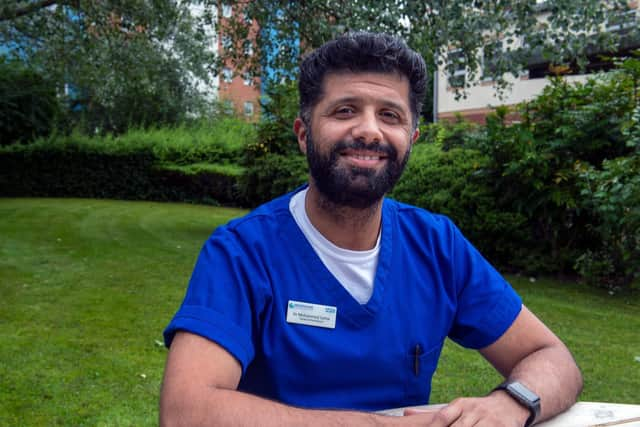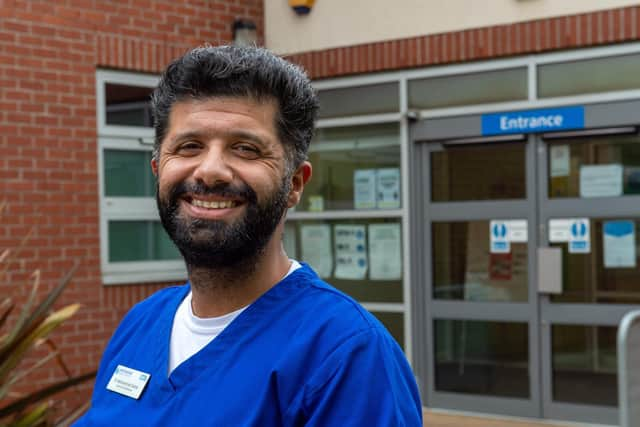Leeds GP says BAME doctors being paid 'thousands of pounds less for the same job
and live on Freeview channel 276
Dr Mo Sattar is a GP at Woodhouse Medical Practice in Leeds and says there is evidence of BME doctors and nurses being paid thousands less than white colleagues doing the same job, there is not enough BME representation at top level in the NHS and that despite years of talking about race equality - little has changed.
His scathing assessment of the institution, rather than individuals he says, comes as the first ever Leeds network for Black, Asian and minority ethnic (BAME) launched for staff working in primary care.
Advertisement
Hide AdAdvertisement
Hide AdDiscussions for such an organisation began in February but were put on hold due to the outbreak of coronavirus and a virtual inaugural meeting took place earlier this month with more than 50 people across the city’s primary care sector taking part.


The network has been established to help tackle inequalities affecting the NHS workforce as well as the communities it serves and follows what Dr Sattar said was already widely known in research that had been “gathering dust”, and that was that “COVID has shone a real light on inequality and disproportionate effects of COVID-19 on specific communities”.
Exposed
“It has exposed it and I think people will say “how are we going to change this and when?”


While the network says it is very grassroots to keep it accessible, Dr Sattar wants it to be a voice and after 12 sessions (it will meet of the first Tuesday of the month) to be helping to shape and change policy.
Advertisement
Hide AdAdvertisement
Hide AdSome of the main drivers behind it are to challenge the lack of BAME leadership in the city and on interview panels, to harness BAME talent which may have been put off by experiences of racism and bullying, to celebrate BAME staff with art and culture and for health leaders to be accountable.
He said: “It is clear from COVID 19 not enough has changed. We have a platform, we have supporters and we have got people who have been in the NHS for a long time who finally have a voice who have the courage to have that conversation.
“Symptoms of inequality in society - they can’t be solved if you don’t look at social, environment, economics, while looking at housing, education, empowerment. If your chances of success or achieving is affected by the colour of your skin, that is not okay.
“But that happens, people at the top are not representative of the communities that we serve.”
Pay inequality
Advertisement
Hide AdAdvertisement
Hide AdHe also went on to say there were examples of a BAME nurse earning £2,700 a year less than a white nurse and a BAME doctor earning £10,000 less a year than a white doctor.
Dr Sattar added: “If you play that out in COVID, if you earn £2,700 less than a colleague you have less savings, can’t afford to buy a laptop for your child to school at home. If you earn less you are more likely to live in a poorer area. If it is a poorer area it might be on a main road, more cars and fumes and leads to chest problems. It is all interweaved and connected.”
Of the wage disparity Dr Sattar said it was “shocking but it does happen” and that while the NHS Workforce Race Equality Standard required trusts to publish data it wasn’t the same within primary care. The network is pushing to create a racial equality standard then it becomes “everybody’s business”.
When asked if he thought the NHS was racist, Dr Sattar added: “Yes. But what I am not saying is that the Chief Executive is racist, but what we know is that structures of the NHS mean that it is difficult not to be”
Advertisement
Hide AdAdvertisement
Hide Ad“It is rare to have a BAME person on an interview panel. If I can’t see a person of authority or who is running that panel that looks like me, I am less likely to go for that job. We are more likely to appoint someone that looks like us.
Failed
“That is an unconscious bias and when we have these conversations, then things start to change. When I drive to work, I think we are doing so much, but there is so much more to do and that drives me.
“We have failed our BAME population and we have got to get it right and can’t be in the same boat in ten years time.”
Tim Ryley, Chief Executive for NHS Leeds CCG, added: “As the organisation responsible for commissioning and funding health services for the city, we have a duty to get this right so that no one is disadvantaged on the basis of race or any other factors that can contribute to health inequalities. For the large majority of people accessing the NHS, primary care is often your front door into services. This means that the primary care BAME network will give us unique insights into staff and patient experiences which we can then use to narrow the inequalities gap.”
Comment Guidelines
National World encourages reader discussion on our stories. User feedback, insights and back-and-forth exchanges add a rich layer of context to reporting. Please review our Community Guidelines before commenting.